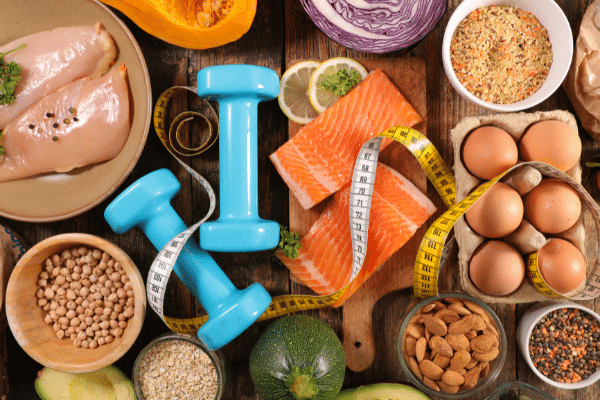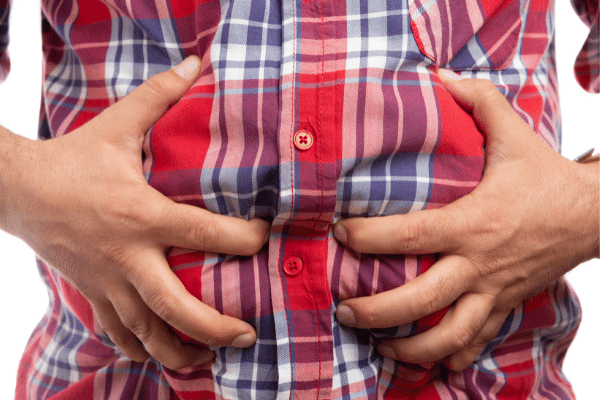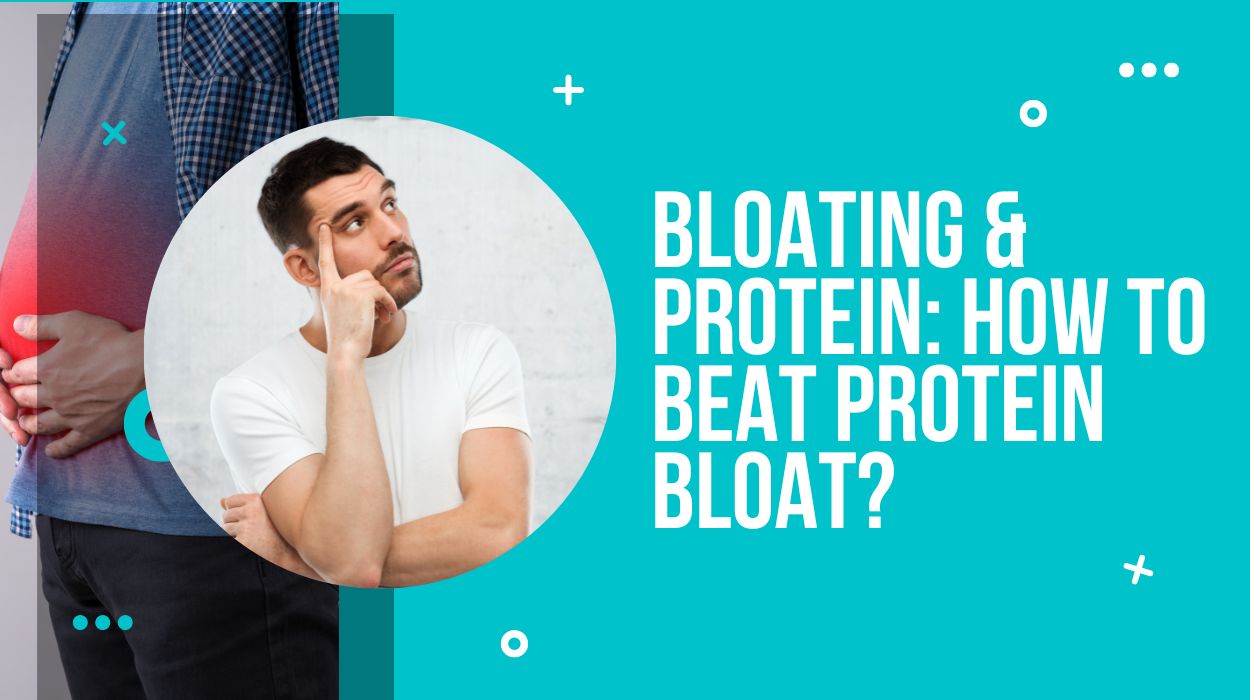People have always said that the more protein you eat, the stronger your muscles will grow! However, they forgot to warn us that too much protein can also lead to bloating! Are you suffering from protein bloating too? If you are looking for a solution to beat that protein bloat or debloat, you are at the right place!
In this article, we will start by learning the root causes of protein bloating, which will help us determine the perfect solution to prevent the protein bloat and also debloat!
6 Reasons: Why do I feel bloated on a high-protein diet?

1. Proteins are hard to digest.
Proteins are the hardest macronutrients to be digested. Proteins contain long chains of amino acids. Digestive enzymes break down these amino acids and consume a lot of energy and time. This property of protein also keeps us satiated for longer durations of time. However, a lack of digestive enzymes in our body can lead to protein buildup in the stomach. Nonetheless, it may also accumulate in the intestines in unprocessed form, causing inflammation and, thus, bloating.
2. Protein is highly acidic.
The normal pH of our stomach is 1.5 to 3.5. However, acidic foods tend to increase our stomach acidity or acid levels. An increase in the acid levels irritates the GI tract. This irritation results in inflammation and thus leads to bloating. Many protein-rich foods are acid-forming that raise the acid levels of the stomach, especially meat and dairy.
3. Whey shakes contain lactose in high amounts.
Whey protein concentrates contain higher amounts of lactose. Lactose intolerant people often fail to digest this lactose present in protein shakes. Inadequate or incomplete digestion of lactose leads to bloating. Hence, always choose whey shakes with low amounts of lactose. Whey Protein Isolates have lesser lactose content and are easier to digest.
Author’s tip: Lactose is present in milk and dairy products. Hence, choosing non-milk protein powder sources like pea and soy will help you prevent bloating caused due to lactose.
4. Other essential macronutrients are being abandoned
While increasing our protein intake, we miss out on the other essential macronutrients, fibers, and fats being one of them. Fibers, both soluble and insoluble, prevent constipation and protein build-up in the digestive tract. Nonetheless, they also balance the gut microbiota. However, protein-based foods like eggs, meat, and peanut butter do not have fiber content. Thus, ingesting low or no fiber at all may lead to bloating.
People consuming a protein-rich diet also often miss out on fats. Sights are known to stimulate bowel movements. According to a study published in the Journal of American College of Nutrition, Omega-3 fatty acids reduce inflammation. Thus, a diet that is a perfect combination of good fats and proteins can help relieve bloating.
Author’s tip: Fishes are a known food item containing high amounts of omega-3 fatty acids. Nonetheless, fishes like Salmon and Sardine have high amounts of protein and high amounts of fats.
5. You are ingesting greater amounts of high-fat protein
High-fat proteins cause water retention leading to bloating. Nonetheless, high-fat proteins also lead to weight gain. Meats are one of the familiar sources of high-fat proteins. Sticking to lean meats instead can help reduce the chances of bloating. Fishes that contain good fats, like omega-3, can also help relieve stomach bloat.
6. Sugar alcohols are the culprit!
Sugar alcohols like sorbitol, xylitol, maltitol, mannitol, erythritol, lactitol, and isomal are the most common ingredients that trigger stomach bloating. Protein foods promising low-calorie sweeteners are the ones that deliver most of the sugar alcohols. Hence, always ensure that your protein shakes contain lesser amounts of sugar alcohol to prevent bloating.
There are various ways protein can cause protein, as we just learned. Assessing and analyzing which of these ways is triggering your bloating will help you find a solution for the protein bloat. Nonetheless, here’s a list of the best ways to beat the protein bloat!
7 Ways to Beat Protein Bloat?

1. Try a different whey protein.
As we previously learned, whey protein concentrates contain high amounts of lactose and are responsible for irritating the digestive tract, leading to inflammation and bloating. However, replacing whey protein concentrates with proteins that contain lower amounts of lactose can prove beneficial.
One such whey protein is whey protein isolate. It contains low amounts of lactose and is more refined. Nonetheless, they have higher protein content too.
Hydrolyzed whey proteins are an excellent option to choose too! Hydrolyzed whey proteins are pre-digested, and thus the body doesn’t have to work extra to digest them. According to a study published in the American Journal of Clinical Nutrition, ingestion of hydrolyzed proteins accelerates protein digestion and absorption which makes them the best whey protein.
2. Avoid overdoing proteins.
Assessing the intake amounts of protein is essential to ensure that you are not overdoing it. The required amount of protein per day is 0.8g/kg bodyweight. According to a study published in Food & Function Journal, consuming proteins >2g/kg of body weight can lead to digestive problems. Hence, avoid overdoing proteins to ensure a sound digestive system.
3. Include more fiber and fats in your diet.
While increasing protein levels in our diet, we often cut down on fibers and fats, thus not ingesting even the required amounts of fibers and fats. Including more fibers and good fats in the diet, or at least in the minimum daily required amounts, can help reduce bloating to a great extent. Sweet potato with skin, whole grains, beans and legumes, bananas, strawberries, mangoes, and raspberries are known food items containing fiber. Avocadoes, oily fish, nuts, seeds, and eggs are good sources of good fats.
4. Try supplements or digestive enzymes.
Proteins are naturally hard to digest, and an inadequate amount of digestive enzymes further add to causing protein bloat. Hence, consuming supplements containing digestive enzymes will help break down the protein and prevent the buildup of proteins and the bloating caused due to it. When consuming digestive enzyme supplements, ensure that they contain ‘protease,’ as they are the main enzymes responsible for the breakdown of proteins.
Author’s tip: Chewing food activates digestive enzymes in the stomach. Hence, improper chewing or gulping down proteins can also induce protein bloating. Hence, eating and chewing slower will help prevent protein bloats too!
5. Include Probiotics in your diet.
An imbalance of the gut’s microbiota is one of the common reasons for protein bloat. Including prebiotics or probiotics like inulin in the diet can help increase the good bacteria in the gut, thus balancing the microbiota.
Author’s tip: Refrigerated probiotics are of higher quality.
6. Eat more alkaline foods.
As we previously learned, protein-based foods are acid-forming, resulting in bloating. Hence, balancing this acidity with alkaline foods can prevent bloating! Apples, raw leafy greens or broccoli, carrots, cauliflower, lime juice, and apple cider vinegar are known foods that contain higher alkaline content and are even low in calories!
7. Drink your protein shakes the right way.
After a workout, protein shakes help you regain energy. However, consuming protein shakes quickly after a workout is not recommended. A gap of 30 minutes post-workout and drinking a protein shake are advised. Nonetheless, your protein shakes being too frothy may also induce bloating. Moreover, drinking protein shakes through a straw leads to air being sucked in, too, causing bloating. Hence, always ensure that your protein shakes are smooth and drink them only with a cup or glass.
Beating the protein bloat is effortless with a bit of modification. However, if you are currently protein bloated and are looking for quick ways to debloat, we got you!
How to Debloat?

A quick walk around the park will help with your bowel movements, helping release the excess gas and stool.
Try yoga poses like Child’s Pose, Happy baby pose, and squats to quicking relieve the bloated gas.
- Peppermint oil capsules are a known method to relieve bloating.
- Abdominal massages by rubbing over your stomach in a circular motion will help relieve your bloated stomach.
- Warm baths and relaxation allow the GI tract to function more effectively, thus reducing the bloat.
- Drink more water and stay hydrated.
- Some of the known food items that can help relieve bloating include:
- Apple Cider Vinegar
- Almonds
- Fennel Seeds
- Lemon
- Ginger
- Pineapple
- Banana
- Melon
- Asparagus
- Papaya
We understand how worried you might have become due to the protein bloat. Here’s a list of the most frequently asked questions that will help you learn more about protein bloat.
Frequently Asked Questions
Q. Can bloating cause weight gain?
Bloating is caused by solid, liquid, or fas accumulation in the digestive tract. However, if a bloated belly is not dealt with on time, it may cause weight gain and even chronic infections.
Q. What happens if I overeat protein?
The excess of protein consumed is stored in the body as fat, whereas the excess of amino acids, the protein breakdown products, are excreted. According to Healthline, this can lead to weight gain after some time, especially if there’s a caloric surplus when increasing the protein intake.
Q. What are the signs of too much protein?
Protein consumed in excess amounts might lead to the following problems:
- Intestinal discomfort or indigestion
- Dehydration
- Unexplained exhaustion
- Nausea
- Irritability
- Headache
- Diarrhea
Nonetheless, protein overconsumption has been associated with chronic diseases like cardiovascular and blood vessel disorders, liver and kidney injuries, and seizures.
Conclusion
Proteins aren’t the root cause of bloating; choosing the wrong protein supplements, overdoing it, or compromising other nutrients to intake higher amounts of protein is. Changing how you consume proteins or making tiny minor changes to your diet, like increasing fiber and omega-3 content or including alkaline foods or probiotics, can help relieve bloating. Nonetheless, if diet changes do not help, supplements like inulin or digestive enzymes. Chewing food slower and drinking more water are also known ways to reduce bloating.
Drop in a comment and let us know which method worked the best for you to beat the bloat!


